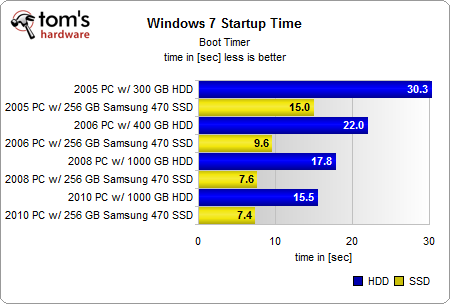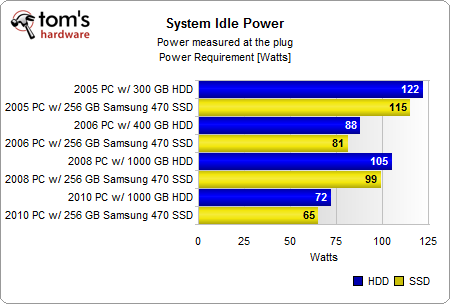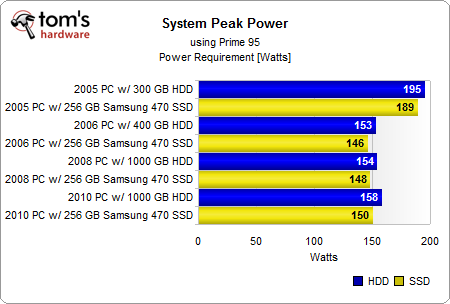Could An SSD Be The Best Upgrade For Your Old PC?
It's a foregone conclusion that SSDs are must-haves in performance-oriented PCs, but our testing reveals that solid-state drives are reasonable upgrades in older mainstream machines, too. We build three old boxes to gauge the impact of an SSD on each.
Benchmark Results: Windows Start Up And Power Consumption
Windows Boot Time
We also decided to track the time needed to launch Windows 7. This is a very relevant test, as everyone can immediately imagine what these differences would feel like. Effectively, using an SSD instead of the HDD cuts the boot time of Windows 7 in half.
System Power Consumption
We also found power consumption benefits, which are most clear as both configurations sit idle. The savings range between 6-8 W on each of the systems when using the SSD instead of the hard drive. Though that's not much, it is a notable benefit if you're already making the switch for performance reasons.
It's actually pretty interesting to look at the overall power numbers for hints as to what has changed over the years. In the case of the 2008 PC, the graphics card required more power than the comparison setup from 2006. Comparing the 2005 system to the 2010 PC not only gives you significantly better performance, but also a reduction of idle power use that exceeds 40%.
The peak power consumption doesn't seem much better, but keep in mind that each new system generation delivers significantly more performance. The latest 2010 system even comes with four processing cores and much decreased idle power. SSDs help, but we have to give credit where it's most due: processor and graphics vendors.
Get Tom's Hardware's best news and in-depth reviews, straight to your inbox.
Current page: Benchmark Results: Windows Start Up And Power Consumption
Prev Page Benchmark Results: PCMark 7 System Benchmarks Next Page Conclusion
Patrick Schmid was the editor-in-chief for Tom's Hardware from 2005 to 2006. He wrote numerous articles on a wide range of hardware topics, including storage, CPUs, and system builds.
-
MAGPC SSD is just too exaggerated, yes it is faster than HDD and may be more reliable but that doesn't justify its price.Reply
Waiting until it is price gets reasonable. -
mayankleoboy1 ReplyThe conclusions we're drawing relate to the mainstream folks trying to get more life from an already-aging box
since its for mainstream, i would have liked a subjective test where some 'average' folks, doing 'average' tasks, would use the machines with/without SSD's, and rate the perceived speed on a scale of 1=10.
those should have been included as well. most people "feel" the speed, rather than benchmark it. -
Please do a test with a Pentium 3 + KingSpec PATA SSD.Reply
I'm very curious about the results. My Dell Lat C400 is chugging along just fine on Windows 7 but I believe a SSD would greatly improve performance. -
I recently bought a Transcend 32GB SSD to be my Boot Drive in my 5+yr old system- Athlon64 3200+ (Venice) S939 , Gigabyte GA-K8N51PVMT-9 ( Geforce 6150), 2 Gb DDR400, WIN7 SP1.Reply
I do not see that the SATA controller mentions AHCI in the device manager tab, however when I run the TRIM check commnand through CMD, it returns a "enabled" reply. Also,have made the necessary registry changes to ensure that AHCI is enabled. There is however no option in the MB bios to set AHCI.
So is my drive configured with TRIM enabled or not? -
buxx I wish I knew the answer to your question too. I have a Dell Dimension XPS600 which I would love to put an SSD into, just as this article suggests. However I can't find any mention of AHCI in the BIOS, manuals or anywhere on the web. Hard to say if it's present, but you would guess not, if they don't mention it... right?Reply
-
compton I think that if you're trying to get more legs out of an older system, a SSD is definitely a great way to do that. Especially with laptops from the past four years -- a Core 2 Duo processor in a laptop still isn't fast, but a decent SSD will make it feel like a new system (at least in my experience) and then some. I think trying to make your Pentium 4 system better with some solid state storage is a lost cause however.Reply
MAGPCSSD is just too exaggerated, yes it is faster than HDD and may be more reliable but that doesn't justify its price.Waiting until it is price gets reasonable.
How much is reasonable? A 64GB Crucial M4 is $105... that's pretty damn reasonable to me. For that kind of money you could get a low-end mobo, an Athlon X4, or 16GB of DDR3. Upgrades don't get much more reasonable than that. But if you already have a decent, if older system, installing an SSD will make it feel like a brand new system should for the least amount of money. -
jsrudd I installed an SSD in my netbook with an 1.6ghz atom processor and it really sped things up. The computer went from unusable to fine for casual usage.Reply -
SpadeM Predictable outcome but informative article non the less. My only concern is that since you talked about mainstream pc, i didn't see any amd equipped system. This is not about AMD vs. Intel it's about storage controller performance. Thinking back, most builds I did back in the 2004 - 2006 time frame where based off nvidia + amd. This article would have painted a more complete picture if it had taken into consideration the other half of the pc landscape. In theory i guess you can argue that yes, if it is AHCI enabled then it "should" be the same outcome as the ICH scenario ... but is it for a fact?Reply -
echdskech Maybe Tom's can do double blind subjective tests like they do in Mythbusters.Reply
Spend 10 mins doing office/internet stuff on each config without knowing which is which and rank them by speed subjectively.


